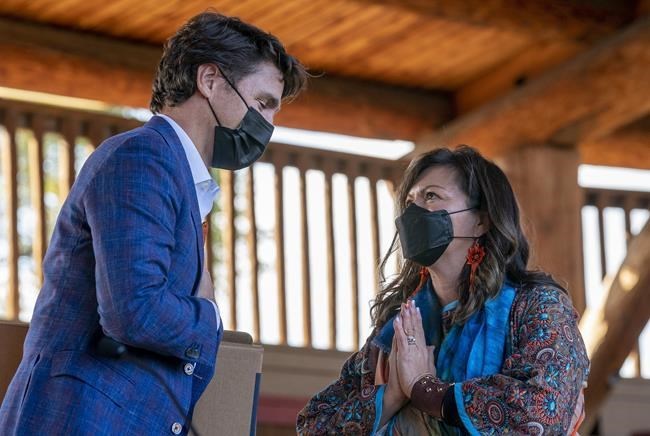OTTAWA — Some Indigenous advocates and leaders say they don't know who Prime Minister Justin Trudeau is talking about when he says Ottawa is holding consultations on a ruling that affirms the need to compensate First Nations children.
Trudeau made the statement earlier this week while visiting the Tk'emlúps te Secwépemc in British Columbia.
Time is ticking down on a 30-day legal window for the Liberal government to appeal a decision released by the Federal Court on Sept. 29 upholding rulings by a human rights tribunal around services and compensation for First Nations children.
Speaking about the ruling in B.C. on MondayTrudeau said "we are consulting with Indigenous partners and leaders" and looking at the "implications" of the decision.
Cindy Blackstock, executive director of the First Nations Child and Family Caring Society of Canada, one of the litigants, says that comment came as a surprise because her group hasn’t heard anything.
“All I can say is everyone I’ve spoken with, no one’s heard anything, so I don’t know who they’re talking to, but the bottom line is the most important people to talk to are those who are actually in the courtroom," Blackstock said Wednesday.
The Chiefs of Ontario, also a party to the case, confirmed in a statement "it has not been consulted by the prime minister or the government of Canada on these matters through any of the mechanisms we have established to discuss the implementation of the tribunal's orders."
It says a national table has been created for consultation on the orders, as well as regional one for Ontario.
Congress of Aboriginal Peoples National Chief Elmer St. Pierre says it hasn’t been consulted despite being an intervener in the case involving the expansion of Jordan's Principle, a rule stating Ottawa steps in when there's disagreement about which level of government provides service to a First Nations child.
Requests for comment to the Prime Minister's Office and Indigenous Services Canada were not immediately returned.
In September 2019, the Canadian Human Rights Tribunal ordered the federal government to pay $40,000 to each First Nations child removed from their home after 2006, as well as to their parents, after earlier ruling Ottawa had discriminated against Indigenous children by knowingly underfunding child and family services on reserve.
It was estimated that around 54,000 children and their parents could be eligible to receive compensation, which would likely cost the federal government more than $2 billion.
Under Trudeau, the federal government sought a judicial review of the decision with the Federal Court. He stressed Monday that children removed from their communities and endured suffering while in the care of provincial authorities "deserve compensation."
"This government will be compensating them. There's no question about that."
Cora Morgan, First Nations family advocate with the Assembly of Manitoba Chiefs, said she found it interesting the Federal Court's ruling to uphold this decision was released on the eve of the country's first National Day for Truth and Reconciliation, designed to honour survivorssent as children to the residential school system.
The discovery of hundreds of unmarked graves by First Nations at the former sites of residential schools in B.C. and Saskatchewan has renewed Canadians' attention to the promises the federal government has made to advance reconciliation, including its implementation of the calls to action from the Truth and Reconciliation Commission, which chronicled the abuses inflicted upon Indigenous children through church-run residential schools.
Blackstock said if Ottawa chooses to file an appeal it would delay justice for the children who suffered under government discrimination and take aim at the top calls to action around improving child welfare.
"These are the most important things that survivors wanted done.”
Morgan said the Assembly of Manitoba Chiefshasn't been consulted despite the fact Manitoba has the highest rate of First Nations children in the provincial child and family system, which she said remains operating at "full speed."
“It’s one thing to engage leadership, but it’s another thing to also engage the people that are affected. There are thousands and thousands of children currently in the child welfare system, there are thousands that have aged out of the child welfare system. We know our prisons and jails are filled with First Nations people that were formerly in the child welfare system," she said.
“In Winnipeg right now we have a homeless population that’s exploded and a majority of those are children that have aged out of the child welfare system. There’s all these negative impacts on our people that should be accounted for when we’re looking at these landmark rulings."
This report by The Canadian Press was first published Oct. 20, 2021.
Stephanie Taylor, The Canadian Press




